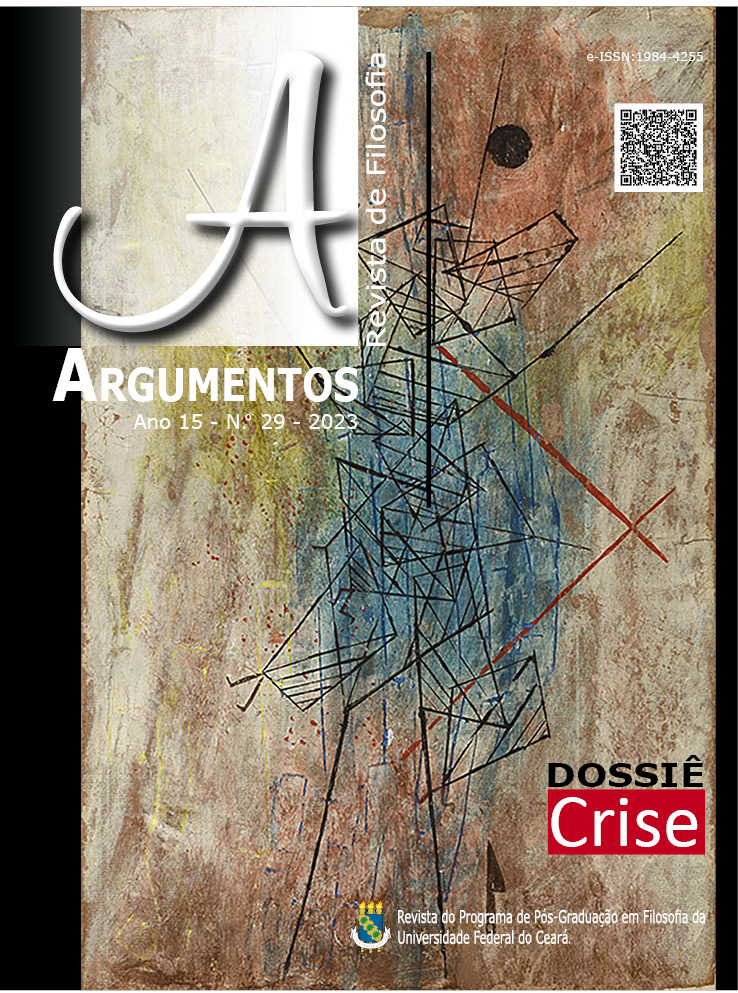The riddle of the word: Levinas and the aphasia of the contemporary world
DOI:
https://doi.org/10.36517/Argumentos.29.11Keywords:
Word. Phenomenon. Riddle. Otherness. Crisis.Abstract
The crisis of the contemporary world can be interpreted to a large extent as a crisis of the word. Levinas thinks that we are part of a civilization of aphasics, dominated by a disconcerting and dehumanizing silence. For him, without the word that comes from a radical otherness, thinking would just be an accumulation of information, without any orientation. Nor would we be able to keep alive the search for truth, which is animated by the desire of the other. We argue in the sense of showing that the word has a double function: a) to teach us the meaning of object orientation (fighting to avoid misunderstandings and obscurities, or, simply, entering the space of reasons); b) signify by contrast to the phenomenon, that is, the word is an enigma, it goes beyond objectification. The word is the meaning that allows us to think “more” than we are capable of aiming at. The word is the condition for a permanent and unpredictable renewal of cultural life.
Keywords: word, phenomenon, riddle, otherness, crisis
References
HAN, B-C. Agonia de Eros. Tradução de Enio Paulo Giachini. Petrópolis: Vozes, 2019.
HEIDEGGER, M. Ser e Tempo (I e II). Tradução de Márcia de Sá Cavalcante. Petrópolis: Vozes, 2002.
HENRY, M. A barbárie. Tradução de Luiz Paulo Rouanet. São Paulo: É Realizações, 2012.
JASPERS, K. Introdução ao pensamento filosófico. Tradução de Leonidas Hegenberg e Octanny Silveira da Mota. São Paulo: Cultrix, 1988.
LEVINAS, E. Carnets de captivité et autres inédits (Oeuvres I). Bernard Grasset/IMEC, 2009b.
LEVINAS, E. De Deus que vem à ideia. Petrópolis: Vozes, 2002.
LEVINAS, E. Descobrindo a existência com Husserl e Heidegger. Tradução de Fernanda Oliveira. Lisboa: Instituto Piaget, s.d.
LEVINAS, E. Difficile Liberté. Paris: Albin Michel, 1995.
LEVINAS, E. Humanismo do outro homem. Tradução de Pergentino S. Pivatto. Petrópolis: Vozes, 1993.
LEVINAS, E. Parole et silence et autres conferences inédites (Oeuvres II). Bernard Grasset/IMEC, 2009a.
LEVINAS, E. Totalité et Infini. La Haye: Martinus Nijhoff, 1974.
Downloads
Published
Issue
Section
License
Argumentos magazine is licensed under an International Creative Commons Attribution License.
The Magazine uses CC BY inclusion
1) The authors retain the copyright granted to the magazine or the right to initial publication, with the work regularly licensed under the Creative Commons Attribution, which allows the sharing of the work with acknowledgment of authorship and initial publication in this magazine.
2) The authors are authorized to contract additional applicable contracts, for non-exclusive distribution of the version of the work published in this journal (for example, publication in the institutional repository or as a chapter of the book), recognition of authorship and initial publication in this journal.
3) Authors are authorized and encourage to publish and distribute their work online (for example, in institutional repositories or on their personal pages) at any time before or during the editorial process, as they can generate productive changes, as well as increase the impact and reference of published work.




.jpg)










._._3.png)
1.jpg)
._._._.png)
